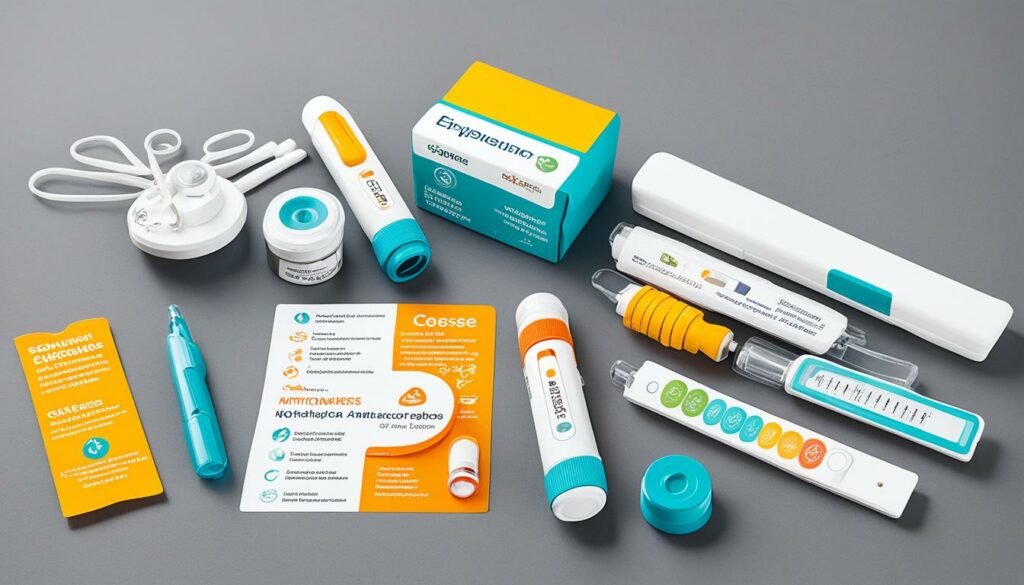An allergic reaction is your body’s response to a substance that it deems dangerous or potentially deadly. It can be caused by various allergens such as foods, medications, insect stings, plants, and chemicals. The duration of an allergic reaction varies depending on the type and severity of the reaction. Mild allergic reactions, such as hives or nasal congestion, may resolve within a few hours to a day with or without treatment. Severe allergic reactions, such as anaphylaxis, can be life-threatening and may require immediate medical attention. The length of time it takes for an allergic reaction to go away can also depend on factors such as the individual’s immune system and the type of treatment received.
Key Takeaways:
- The duration of an allergic reaction varies depending on its type and severity.
- Mild reactions, like hives or nasal congestion, may resolve within a few hours to a day.
- Severe reactions, such as anaphylaxis, require immediate medical attention and can last for many hours.
- The individual’s immune system and the type of treatment received also influence the duration of an allergic reaction.
- Proper management and prevention of allergies are crucial to minimize their impact.
Types of Allergic Reactions and Their Duration
Allergic reactions can manifest in various ways, and their duration can vary accordingly.
An allergic contact dermatitis, which is a skin reaction, typically occurs one to two days after exposure to an allergen and may last for weeks.
In the case of oral allergy syndrome, itching of the mouth or throat occurs within minutes of consuming certain foods. This reaction usually lasts for a short duration.
Systemic allergic reactions, such as those caused by food allergies, can last for a few hours up to a couple of days, depending on the severity and amount of exposure.
Anaphylaxis, a severe and potentially life-threatening allergic reaction, typically peaks within 30 minutes of exposure and may persist for several hours.
| Type of Allergic Reaction | Typical Onset | Duration |
|---|---|---|
| Allergic Contact Dermatitis | 1-2 days after exposure | Lasts for weeks |
| Oral Allergy Syndrome | Within minutes of consumption | Short duration |
| Systemic Allergic Reaction | Varies | A few hours to a couple of days |
| Anaphylaxis | Within 30 minutes of exposure | Several hours |
Factors Influencing Allergy Duration
Several factors can influence the duration of an allergic reaction. Understanding these factors can help individuals effectively manage their allergies and seek appropriate treatment. The following are key factors that affect the duration of an allergic reaction:
Length of Exposure
The length of exposure to an allergen plays a significant role in determining the duration of symptoms. Prolonged exposure can lead to a longer-lasting allergic reaction. For example, individuals who are continuously exposed to pet dander may experience prolonged symptoms compared to those who have brief or occasional exposure.
Severity of Reaction
The severity of the allergic reaction also influences its duration. Mild allergic reactions, such as sneezing or a rash, may resolve more quickly than severe reactions. Severe allergic reactions, such as anaphylaxis, can have a longer duration and may even require immediate medical attention to manage the symptoms effectively.
Individual’s Immune System
Each individual’s immune system reacts differently to allergens. Some individuals may have a more robust immune response, leading to prolonged allergic reactions. Conversely, others may have a more efficient immune system and experience shorter durations of allergic symptoms.
Type of Treatment
The type of treatment received for an allergic reaction can significantly impact its duration. Medications such as antihistamines or corticosteroids can help alleviate symptoms and shorten the duration of the reaction. Effective treatment can provide relief and facilitate a quicker recovery from allergies.
By considering these factors, individuals can gain a better understanding of their allergies and work towards effectively managing and minimizing the duration of their allergic reactions.

| Factors | Impact on Allergy Duration |
|---|---|
| Length of Exposure | Prolonged exposure to allergens can prolong the duration of symptoms. |
| Severity of Reaction | Severe allergic reactions may have a longer duration compared to mild reactions. |
| Individual’s Immune System | Differences in immune responses can lead to variations in the duration of allergic reactions. |
| Type of Treatment | Appropriate treatment can help alleviate symptoms and shorten the duration of allergic reactions. |
Managing and Preventing Allergic Reactions
When it comes to allergies, managing and preventing allergic reactions is essential in order to minimize their duration and impact. By taking proactive steps, you can effectively reduce the risk of experiencing severe allergic reactions and improve your overall quality of life. Here are some important strategies to consider:
Identifying Triggers
One of the key aspects of managing allergies is identifying the specific triggers that cause your allergic reactions. By knowing what substances or environments trigger your allergies, you can take steps to avoid exposure and prevent allergic reactions from occurring in the first place. Allergy testing, conducted under the guidance of a medical professional, can help pinpoint your specific triggers with accuracy.
Allergy Treatment Options
There are several treatment options available for allergies, ranging from over-the-counter medications to more specialized interventions. Some common allergy treatment options include:
- Antihistamines: These medications help block the effects of histamine, a chemical released during an allergic reaction. They can alleviate symptoms such as itching, sneezing, and runny nose.
- Nasal corticosteroids: These nasal sprays help reduce inflammation and relieve symptoms like nasal congestion and postnasal drip.
- Decongestants: Decongestant medications can help relieve nasal congestion caused by allergies, promoting easier breathing.
- Epinephrine: In severe allergic reactions, such as anaphylaxis, epinephrine (administered through an autoinjector) can help reverse the symptoms and provide immediate relief until emergency medical assistance is available.
It is important to consult with your healthcare professional to determine the most appropriate treatment options for your specific allergies.
Allergy Response Plan
Creating an allergy response plan is crucial, especially for individuals with severe allergic reactions. An allergy response plan, developed in consultation with a healthcare professional, outlines the necessary steps to be taken in the event of an allergic reaction. It typically includes the following:
- Identification of specific triggers and how to avoid them.
- Instructions on the proper use of allergy medications, including epinephrine autoinjectors, if required.
- Emergency contact information, including the contact information of healthcare providers.
- Guidelines on when to seek immediate medical assistance.
Carrying an allergy response plan and necessary medications, such as epinephrine autoinjectors, can help you respond effectively to allergic reactions and minimize their impact on your health and well-being.
Regular Monitoring and Follow-up
Ongoing monitoring and follow-up with healthcare professionals are essential components of long-term allergy management. Regular check-ups can help track the effectiveness of your treatment plan, make necessary adjustments, and address any emerging concerns. By staying proactive and keeping your healthcare team informed, you can optimize your allergy management and improve your overall quality of life.
Remember that effective management and prevention of allergic reactions require a comprehensive approach that combines identifying triggers, utilizing appropriate treatment options, creating an allergy response plan, and maintaining regular communication with healthcare professionals.

Conclusion
Allergic reactions can vary in duration, ranging from a few minutes to several days. The length of time it takes for an allergic reaction to subside depends on the type and severity of the reaction. Mild allergic reactions, such as hives or nasal congestion, typically resolve within a few hours to a day. However, severe reactions like anaphylaxis can persist for many hours and require immediate medical attention.
To find relief and facilitate recovery from allergic reactions, it is essential to seek appropriate treatment and follow a comprehensive management plan. Treatment options such as antihistamines, nasal corticosteroids, and epinephrine can provide relief and alleviate symptoms. It is also important to understand the factors that influence the duration of an allergic reaction, including the length of exposure, the severity of the reaction, the individual’s immune system, and the type of treatment received.
Prevention is key in managing allergic reactions. By identifying and avoiding triggers, creating an allergy response plan, and carrying necessary medications like epinephrine autoinjectors, you can minimize the impact of allergic reactions on your daily life. Regular monitoring, follow-up with healthcare professionals, and making necessary adjustments to your allergy response plan are crucial for long-term management and prevention.
FAQ
How long does it take for an allergic reaction to go away?
The duration of an allergic reaction can vary depending on the type and severity of the reaction. Mild allergic reactions may resolve within a few hours to a day, while severe reactions like anaphylaxis can persist for many hours and require immediate medical attention.
What are the types of allergic reactions and how long do they last?
There are various types of allergic reactions. Allergic contact dermatitis, which is a skin reaction, typically lasts for weeks. Oral allergy syndrome, which causes itching of the mouth or throat, usually lasts for a short duration. Systemic allergic reactions, such as those caused by food allergies, can last for a few hours up to a couple of days. Anaphylaxis, a severe and potentially life-threatening reaction, peaks within 30 minutes and may persist for several hours.
What factors influence the duration of an allergic reaction?
The length of exposure to the allergen, the severity of the reaction, and the individual’s immune system can all affect how long an allergic reaction lasts. The type of treatment received, such as antihistamines or corticosteroids, can also influence the duration and resolution of symptoms.
How can allergic reactions be managed and prevented?
Treatment options for allergies include antihistamines, nasal corticosteroids, decongestants, and epinephrine for severe reactions like anaphylaxis. Avoiding triggers and creating an allergy response plan in consultation with a doctor are crucial in preventing allergic reactions. Regular monitoring, follow-up with healthcare professionals, and carrying necessary medications like epinephrine autoinjectors can help manage and respond effectively to allergic reactions.
What is the lifespan of an allergic reaction?
Allergic reactions can range in duration from a few minutes to several days. The duration depends on the type and severity of the reaction. Seeking appropriate treatment for allergies and following a comprehensive management plan can help find relief and facilitate recovery.









